- Home
- Joseph Bruchac
The Long Run Page 5
The Long Run Read online
Page 5
“Yes, sir. Do you know who John Muir was?”
“No. Who was he?”
“Why did I say that? I’m talking too much again,” Travis thought. But now he had to answer.
“My grandpa told me about John Muir. He wrote about nature. He walked all the way across the country. All he took with him was an extra pair of socks, a knife, a notebook, and a pencil.”
The sergeant shook his head again. “So why are you going to Maine?”
“I’m going to my grandparents’, sir. They live there.”
“What about your parents?”
“My mother, she . . . passed on. My Dad is out of work. So it would be easier for me to live with my grandma and grandpa in Maine.”
Sergeant Abourezk raised one eyebrow. “Maine? How are you getting there?”
“First by bus. But mostly hitching, sir. I don’t have a lot of money. I’m doing okay, though. I started three days ago in Seattle, and I got this far.”
The sergeant whistled softly. “From Seattle to Sioux Falls? A thousand miles all on your own?” He shook his head.
“People have been really nice, sir,” Travis said.
Sergeant Abourezk smiled for the first time. “And you’re a nice kid, aren’t you?” He nodded. “Yup! I saw what you did with this mother cat and her kittens. If you hadn’t done that, you would have likely gotten away.”
“Yes, sir, I would.”
The sergeant laughed. “Travis, no one in the last ten years has called me sir as often as you have. I don’t hear that word much on this job. Let me ask you another question or two. You tell me the truth, okay?”
“Yes, sir.”
“Okay. Question one: You break any laws?”
Travis shook his head. “Not any I know about, sir.”
Sergeant Abourezk laughed again. “First you run like a track star. Then you answer like a lawyer. Let me put it another way. You got a guilty conscience about anything?”
Travis thought about that. He’d left his father without telling him. But he didn’t feel guilty about that. He also didn’t feel guilty about putting that bag of stuff in Mannie’s room. And he certainly didn’t feel guilty about jumping out of the drunk woman’s car.
“No, sir. Not at all.”
“Have you taken anything that wasn’t yours?”
Travis started to shake his head. Then he stopped. “Well, I did take some food out of a dumpster. But it had been thrown away, and it was still good, and . . .”
Travis stopped talking. He was saying too much again. Why was he doing that? And he was really tired. He hadn’t realized how tired he was. The mother cat came and rubbed against his leg. He looked down at her. So did the policeman.
Sergeant Abourezk patted him on the shoulder. “Okay, Travis. Enough questions.” He knelt down and petted the mother cat. “Now help me with these guys.”
Travis lifted up the mother cat and two of the kittens. The sergeant picked up the other ones. He pulled a cardboard box from the trash.
“This will do for now,” he said.
They put the eight cats in the box. Travis lifted the box and looked down at them. The mother rolled onto her side and the kittens started nursing. She began to purr.
“My cruiser’s four blocks that way. Follow me.”
“Am I under arrest?”
The sergeant looked back at him. “No, son. We’re going to the shelter.”
“Oh no,” Travis thought. “Another homeless shelter? What if they’ve heard about me running away? I’ll get sent back to Seattle.”
He thought again about running. But he couldn’t do that carrying the mother cat and her kittens. Plus the policeman had his backpack and his knife. He needed them. He followed the sergeant to his police car.
The sergeant opened the back door. “Watch your head.”
Travis put the box with the cats in it on the seat. Then he climbed in. The sergeant shut the door behind him.
Travis had never been in a police car before. There was a mesh screen between him and the front seat. He could see a small computer on the dashboard. A shotgun was holstered on the driver’s-side door. There were papers and a clipboard on the front seat.
The sergeant slid in behind the wheel. He spoke into a microphone. Travis couldn’t understand most of what he said. Then he put down the mic and dialed a number on his phone. Once again he had a conversation, most of which Travis couldn’t hear . . . until the last few words.
“You’re sure about that? Yup? Okay, Auntie!”
Sergeant Abourezk turned to him. “Buckle up.”
Travis fastened his seat belt. The car slid out from the curb as the sergeant spun the wheel. Travis didn’t remember closing his eyes, but when he opened them, the car had stopped again. The box with the cats was gone. He blinked and looked through the window. They were in front of a low white building. The sergeant was walking back toward the car. He unlocked the door and climbed in.
“Sorry to lock you in, son. Standard operating procedure. Didn’t want you hijacking my vehicle while I was gone.”
He laughed after saying that.
“Should I get out here?” Travis asked.
The sergeant looked back over his shoulder at him. “Why? You want to check in at the animal shelter with your new friends?” He laughed again.
Animal shelter? Not a homeless shelter?
“Where are we going now?”
“You’ll see.”
Travis watched out the window as they drove. They went over a bridge.
“Sioux Falls is down there,” the sergeant said. He pointed out the window to his left. “Too dark to see much now. You can check them out tomorrow.”
They pulled into a parking lot at a sort of shopping mall. Above the lot was an elevated line of stores and restaurants.
“Up there,” the sergeant said. “Follow me.”
They went up the steps, passing by dark storefronts. No one else was around.
The sergeant paused. “You’re pretty strong, right? Good at carrying things?”
“I guess so,” Travis said. “I don’t mind working.”
“Thought not.”
They had stopped in front of a closed restaurant with a sign that read “Sanaa’s Gourmet Mediterranean.”
“Best Syrian food in town.”
Travis got the joke. “The only Syrian food in town?”
Sergeant Abourezk laughed. “Yup! You got it, young man. But it’s also the best food in town. Maybe the whole state.”
He rapped on the door. A light came on from the back. Then a dark-haired woman came forward. She didn’t look young, but there was a warm smile on her face.
“She must have been beautiful when she was young,” Travis thought.
She opened the door.
“Hello, Aunt Sanaa,” the sergeant said.
“Is this my young worker?” she asked.
“Yup.”
She looked at Travis. “Can you move things? Heavy things?”
Travis nodded. “Yes, ma’am. At least I can try.”
Sergeant Abourezk laughed. “See what I mean? He’s an honest one.”
“Polite, too,” Aunt Sanaa said. “He’ll do.”
Travis looked at the sergeant. It was late and he was confused.
The sergeant smiled. “Okay, son. Here’s the deal. You can help out for a few hours tomorrow cleaning out a storeroom. You’ll be taking the place of someone who called in sick. In return you get a place to stay tonight, and you get fed tomorrow. Then my uncle Jim will give you a ride. He’s on his way to LaCrosse, Wisconsin. Sound good?”
“Sounds wonderful,” Travis said. “Thank you so much, Sergeant.”
The sergeant took his hand. “Ray,” he said. “You can call me Ray, Travis. We cat rescuers operate on a first-name basis.”
Then he handed Travis back his knife and pack.
“Good luck getting to your grandparents’.”
“Thank you, sir.”
Sergeant Abourezk laughed. “
What did you say?”
“Thank you, Ray.”
8
The Senator
Travis woke up feeling confused. The bed underneath him was so much softer than the ground he’d been sleeping on that it made his back hurt. Where was he?
He looked around. He was in a small room lined with shelves of boxes and jars. Food.
He sat up. The flowered quilt that had been placed over him slid off. He put his feet on the floor. His sneakers were there. So was his backpack. He’d slept in his clothes.
Then he remembered. He was on a cot in the back room of the restaurant. The place Sergeant Ray had taken him last night.
He smelled something. Food was being cooked in the next room. It didn’t smell like anything he’d ever eaten before, but it smelled really good.
“Are you awake now, little bird?” a voice called from another room. “You are the last bird to rise this morning.”
It was a pleasant voice, a musical voice. Why did it sound familiar? Then he recognized who it belonged to. It was the voice of Aunt Sanaa, the woman who owned the restaurant. “There is a washroom back there, my young worker. Use it and then come and eat.”
Travis went into the small washroom. He combed his hair back with his fingers. He breathed on the palm of his hand and smelled it. He hoped his breath wasn’t too bad. There was no mouthwash. He rinsed his mouth with water and then walked out into the kitchen. The kitchen opened into the restaurant, which was not yet open for the day. But there was food on a small table.
Aunt Sanaa smiled at him. “You are hungry? Sit and eat. Then I shall work you until your fingers are worn to the bone.”
Travis worked all through the morning. The storeroom needed to be cleaned and there were many things to move. It was hard work, but not too hard. When Travis was done, Aunt Sanaa came to inspect.
“Fine,” she said. “And faster than I expected. Did you take any break?”
“I didn’t really need a break, ma’am.”
She looked him up and down, from his feet to his forehead. “My husband’s nephew is a good judge of men, Travis. That is why he brought you here. You are a fine young man. Your parents must be proud of you.”
Travis started to say something, but the words caught in his throat. He blinked because his eyes were burning. Aunt Sanaa did not notice. She had already turned away.
“Come,” she said, gesturing back at him. “Bring your things. The car is outside.”
It was more than just a car. It was a big black limousine. The back door opened as he approached. A balding older man with a friendly, intelligent smile leaned forward and gestured to him.
“Get in, get in.”
As Travis leaned forward, the man grabbed his hand with surprising strength and pulled Travis in, swinging him over to sit next to him.
“Let’s go,” the man said, pulling the door shut. “Drive on, Milton!” The car shot forward, pushing Travis back into the seat as it accelerated.
The older man swung his hand to indicate where they were. “Not the way I usually travel. But when a limo gets sent to take you to a meeting, that limo gets used. That’s one of the perks of having been a famous person. Or should I say infamous?”
The man laughed. It was a warm, friendly laugh that put Travis at ease. The man looked at Travis with shrewd eyes.
“I see quite a story in you, young man.” He held out his hand. “James Abourezk,” he said. “Just call me Jim. And you?”
Travis took his hand. This time the man grasped him gently. An Indian handshake, not one of those white man ones where your hands get squeezed and your fingers almost get broken.
“Travis, sir. Travis Hawk.”
“Indian, right? Or ‘Native American,’ as our politically correct white folks say these days.”
“Yes, sir.”
“But not local. You don’t have a Lakota look about you. One of the eastern nations?”
Travis just nodded this time. He wasn’t sure what to say or if he even needed to say anything at all. The man was doing enough talking for the both of them.
Jim Abourezk laughed. “You’re thinking that I’m monopolizing the conversation? Don’t bother to answer that. I already hear it often enough from my wife. It’s the result of a few years in Washington. Though not nearly few enough if you were to listen to my Republican colleagues.”
“Yes, sir,” Travis said.
That prompted an even larger laugh from the former senator. Then he kept talking. He was interesting to listen to, even if Travis knew little about politics. He talked about things Travis had only heard about in history class. About what President Nixon did, and about being a liberal senator from a non-liberal state and then losing his seat.
“To a clown. And a crooked one at that.”
Travis closed his eyes. He hadn’t realized how tired he was. When he opened them again, it was dark outside and the senator was no longer talking. He was leaning back and snoring. Travis shifted in his seat and the senator sat up and looked outside.
“Ah,” he said, catching sight of a roadside sign. “Travis, have you been asleep?”
“Yes, sir.”
The senator nodded. “Just as well. All you missed was most of the state of Wisconsin.”
The sun was rising as they crossed the bridge over the Mississippi. The waters were turning shades of color Travis had never seen before.
The senator nodded. “Even at my age, seeing this still brings a lump to my throat. America the beautiful. It’s a wonderful land we have, young man. Isn’t it?”
“It is, sir,” Travis said.
“And still, after the way your people have been treated—and the way my own Arab people are being treated now—we love it, don’t we?”
“We do, sir. We really do.”
“There’s more good than bad here, you know.”
Travis nodded. He knew that to be true. He knew it from what he’d experienced the past few days.
They were just passing a truck stop. Big tractor trailers were parked in front of it. The senator leaned forward and tapped on the window.
“Stop here, Milton. Thank you.” he said.
The driver pulled the car over.
“Travis, it has been a pleasure traveling with you,” the senator said. “Hope you didn’t mind my talking your ear off. Those semis there are all long-haul vehicles, and I can’t think of a better place for you to attempt to get a ride east.”
He opened the door and Travis climbed out, his legs stiff from the long ride. The senator handed his backpack to him.
“There’s an old saying in Arabic,” the senator said, “to wish a traveler a good journey.” He chuckled. “Unfortunately, I don’t know it.” He shook Travis’s hand. “Good luck, young man. Keep loving this land—even if our politicians don’t always deserve it.”
“I will,” Travis said. “Thank you, sir.”
The door shut and the black limo drove away.
9
Big Rig
The sun was beating down hard on Travis’s head. Drops of sweat were running down his cheeks like glistening beads. Huge semis were pulling out of the truck stop. Some of them were hauling two trailers. He heard the gears shift and the whoosh of the air brakes. One after another went by without pausing.
Travis kept holding up his sign with one hand while waving with the other. He smiled as best he could, even though he was beginning to feel like a wilted plant. Was anyone going to stop before he died of heat stroke?
Just as he had that thought, the next truck coming out of the driveway pulled over. It wasn’t as large as any of the semis that had passed him. It made up for its size with its color, though. It was painted with rainbows, rain-forest trees, and tropical birds. The words “Miami Momma” were written on its side.
“Miami?” Travis thought. That was about as far south from Maine as you could get on the East Coast. Did he really want to accept a ride from a truck going that way? On the other hand, did he want to end up like an overcooked hambu
rger?
The truck had stopped fifty yards beyond him.
WHOONK! WHOONK!
The driver was blowing the tractor trailer’s horn. It was a message for him to hurry up if he was coming. Travis began to run.
When he reached the truck, the door on the passenger side swung open as he grabbed the rail to climb up. It was so bright in the sunlight that he couldn’t see the driver inside the cab. But then he heard a voice.
“Climb on in.”
It was a woman’s voice.
Travis hesitated. The last ride he’d accepted from a woman hadn’t ended well.
“Come on,” the woman said. “I’m on the clock and time’s a wastin’.”
Travis still couldn’t see the woman, but her voice sounded friendly. It also had a Southern accent.
“Thank you, ma’am,” he said. “But are you going east?”
The woman laughed. Her laugh was a deep one, and somehow it was reassuring.
“You read my name, eh? Don’t let it fool you. Miami is just where I’m from and where I wish I could be. That’s why Rufus painted our truck up this way. He knew it would tickle me to have a whole jungle on the side of a refrigerated rig. I’m taking this load of lettuce all the way to Bangor, Maine. That far enough east for you?”
Travis climbed in and shut the door. The door was so tight that his ears popped. The air in the truck was as cool as a late-autumn breeze, and it smelled almost as fresh. He looked at the woman. He could see her face now. It was red, as if she’d just scrubbed it. She had a big nose and a wide mouth, red hair, and eyes as blue as the sky. She wasn’t young at all. Probably as old as forty.
She stuck out a hand. “Mimi,” she said. “Mimi Kinnell. And you?”
“Travis. Travis Hawk, ma’am.”
Mimi Kinnell grinned so wide that Travis could see she had teeth missing on either side of her mouth. “Hawk? The way you sprinted to my truck, you ought to be called Deer! You are one fast runner.”
“I guess so,” Travis said.
Mimi Kinnell turned her gaze toward her side mirror, worked the gears, and pushed down on the accelerator. The truck swung out smoothly onto the road and began to pick up speed.
“So where out east you heading?” she asked, her eyes flicking down on a small computer monitor.

 Peacemaker
Peacemaker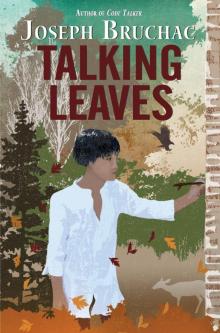 Talking Leaves
Talking Leaves Found
Found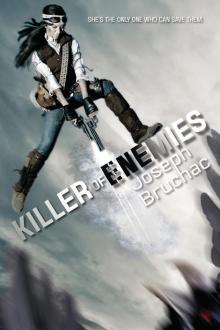 Killer of Enemies
Killer of Enemies Wabi
Wabi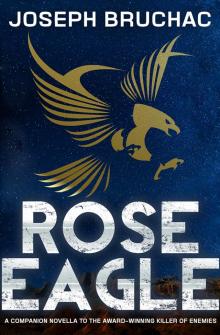 Rose Eagle
Rose Eagle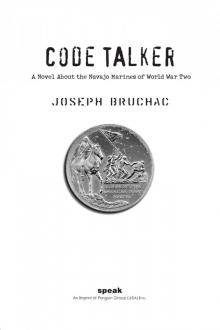 Code Talker
Code Talker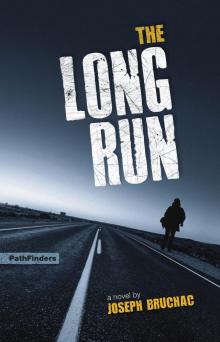 The Long Run
The Long Run Dragon Castle
Dragon Castle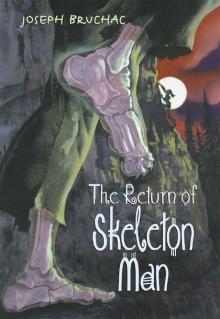 The Return of Skeleton Man
The Return of Skeleton Man Pocahontas
Pocahontas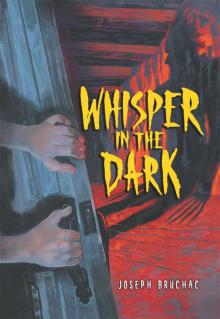 Whisper in the Dark
Whisper in the Dark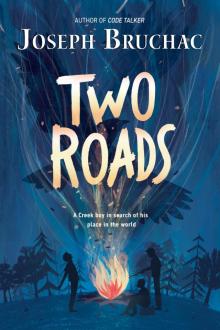 Two Roads
Two Roads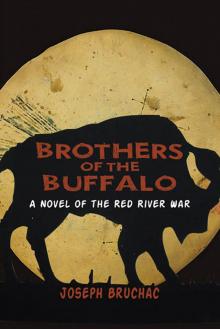 Brothers of the Buffalo
Brothers of the Buffalo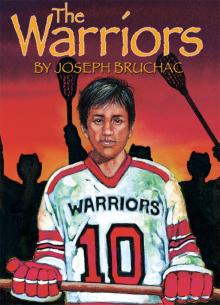 The Warriors
The Warriors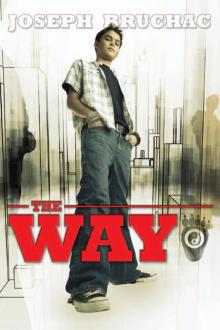 The Way
The Way Sacajawea
Sacajawea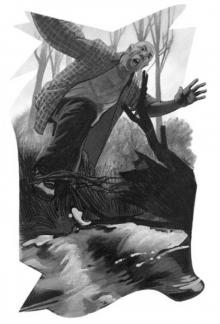 Night Wings
Night Wings March Toward the Thunder
March Toward the Thunder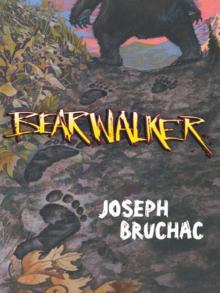 Bearwalker
Bearwalker Skeleton Man
Skeleton Man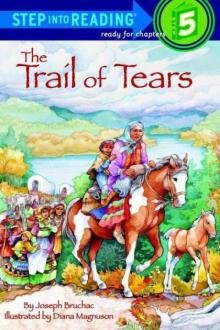 The Trail of Tears
The Trail of Tears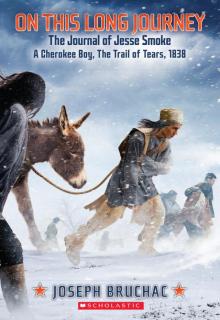 On This Long Journey
On This Long Journey Flying with the Eagle, Racing the Great Bear
Flying with the Eagle, Racing the Great Bear